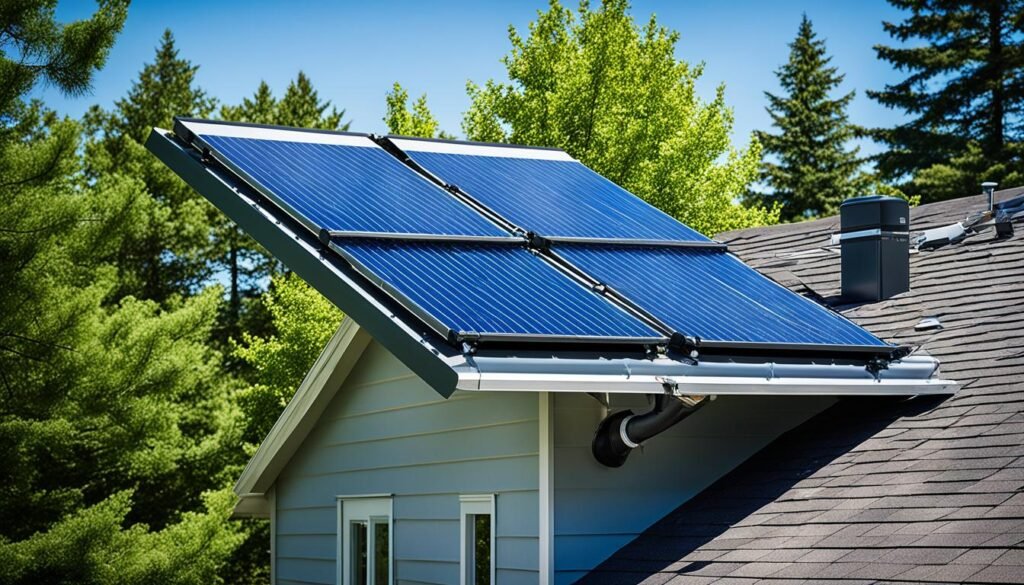Solar water heaters, also known as solar domestic hot water systems, offer a cost-effective and eco-friendly alternative for generating hot water in homes. Using the sun’s power, which is free and renewable, makes them perfect for all climates.
Two main types exist: active and passive solar water heating systems. Active ones use circulating pumps and controls. On the other hand, passive systems don’t. Active systems are divided into direct and indirect circulation types based on water movement. Direct systems work best where it doesn’t freeze, while indirect ones are good for colder places.
Passive systems are cheaper but less efficient compared to active ones. They have integral collector-storage and thermosyphon systems, each fit for various homes.
Solar heating needs storage tanks and solar collectors, like flat-plate, integral collector-storage, or evacuated-tube collectors. Most need a backup system for cloudy days or high demand periods, such as conventional heaters or tankless water heaters.
Before getting a solar water heating system, consider its cost and efficiency, evaluate your site’s solar resource, decide on the system size, and check local regulations. Proper system maintenance is crucial. Passive systems need less upkeep, whereas active ones might need more attention over time. Choose a skilled and licensed contractor for setup and maintenance.
Solar water heaters are a great way to cut energy costs and lower your carbon footprint sustainably.
Key Takeaways:
- Solar water heaters are cost-effective and eco-friendly alternatives for generating hot water in homes.
- There are two main types of solar water heating systems: active and passive, each with its own advantages and suitability for different households.
- Proper installation, maintenance, and regular assessment of the site’s solar resource are essential for optimal performance.
- Solar water heaters offer homeowners the opportunity to reduce their carbon footprint and achieve long-term energy cost savings.
- Consider incentives, such as tax credits or rebates, that may be available to offset the upfront costs of solar water heating systems.
The Environmental Benefits of Solar Water Heaters
Solar water heaters bring many good things to our planet compared to usual water heaters. They use sunlight to work, cutting down on fossil fuel use. This leads to less carbon emissions and helps the earth.
These systems are great because they change sunlight into heat without losing much energy. They are much more efficient than old-style water heaters. Those older ones use more energy and aren’t good for the planet.
When people pick solar water heaters, they use the sun’s endless energy. This helps lessen harm to our environment.
Choosing solar water heaters is smart for the environment and saves money over time. They cost more at first, but lower your energy bills later. There are also tax breaks or rebates from many governments to help with the cost.
Overall, picking renewable energy water heaters like solar ones is good for the planet. It helps homeowners lower their carbon footprint and work towards a better future.

The Cost-Effectiveness of Solar Water Heaters
Solar water heaters may cost more at first compared to regular ones. But they save you money on energy bills in the long run. With enough sunlight, they eventually cover their own costs by lowering your utility bills. Also, many governments give tax credits or rebates for using solar energy systems. These can lower the starting costs, making solar heaters an appealing choice for homeowners.
Choosing cost-effective eco-friendly hot water solutions lets homeowners save cash. At the same time, they reduce harm to the environment.
Conclusion
Solar water heaters give eco-conscious homeowners in Corona green options. They use the sun’s power, cutting down on fossil fuel use. This helps our planet.
These heaters also save money on energy bills, despite their higher upfront cost. Over time, homeowners can save a lot and might get incentives too.
Choosing these water heaters reduces your carbon footprint. You get reliable hot water while supporting energy efficiency. It helps us build a greener community.
Switch to these green technologies today. By doing this, you help create a better future for everyone.
